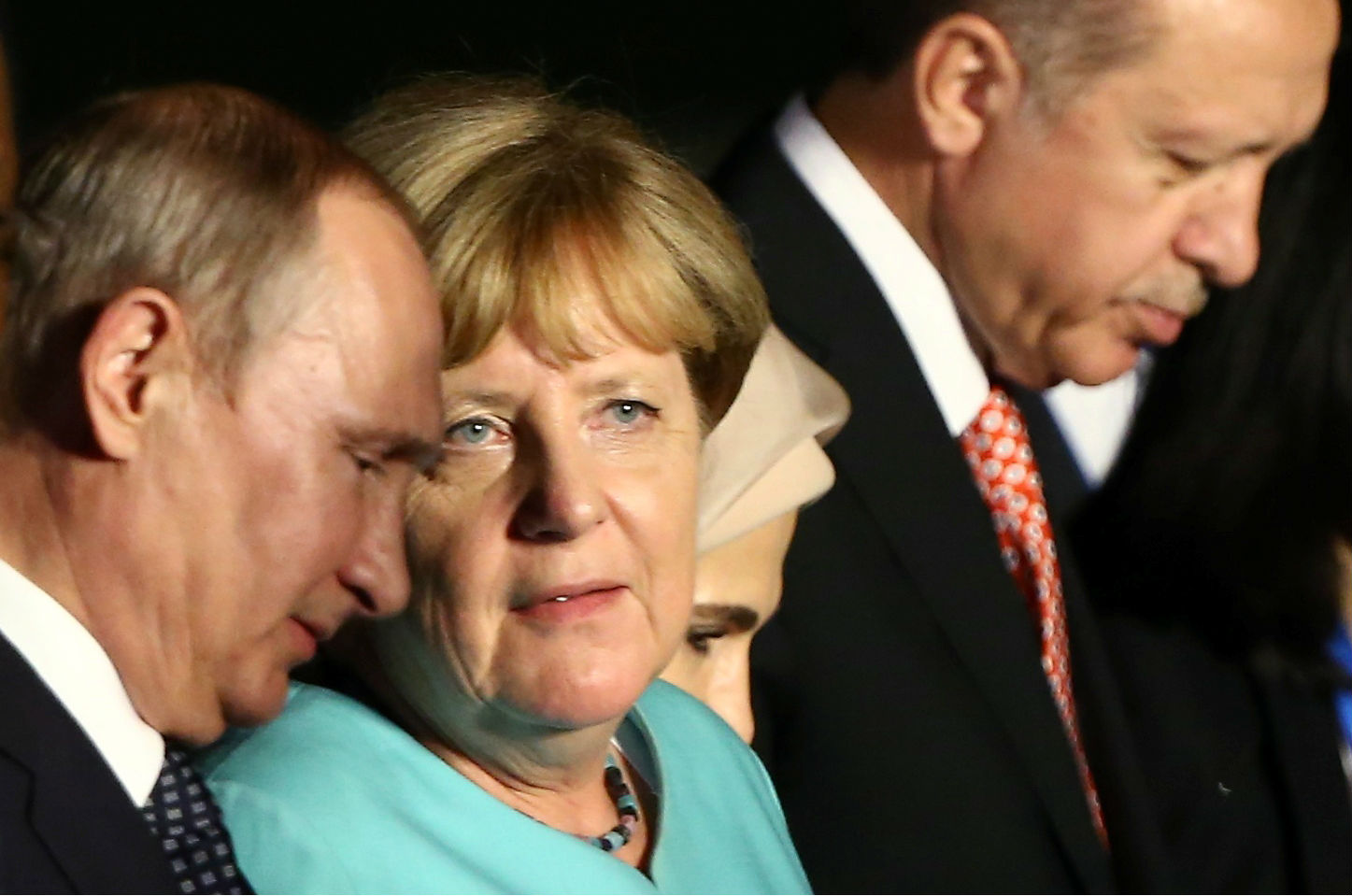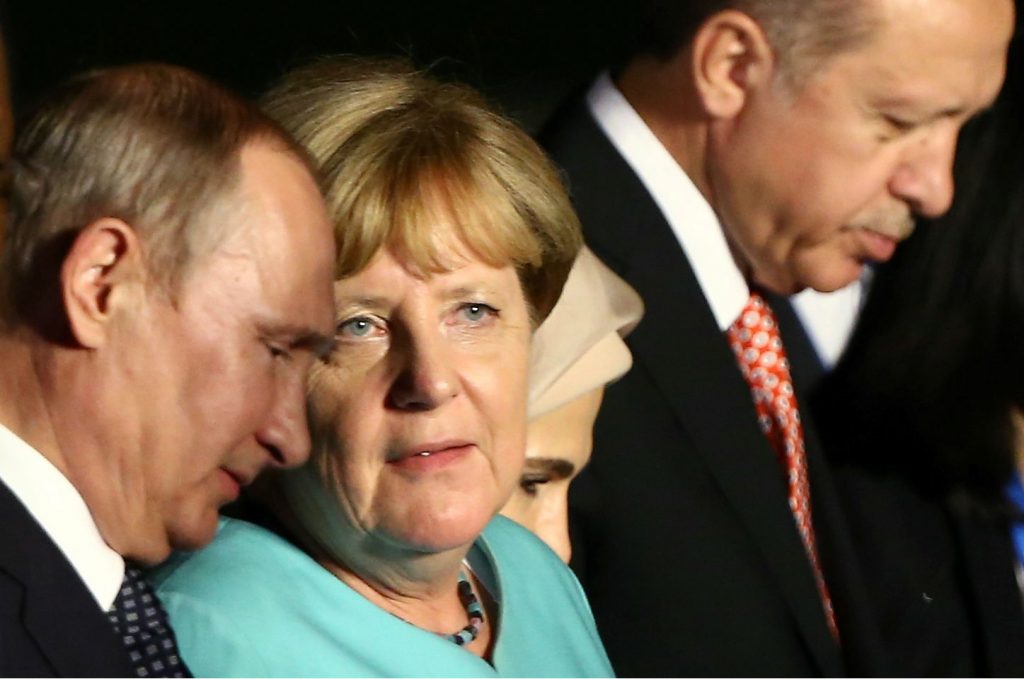 When Russia illegally annexed Crimea and armed separatists in eastern Ukraine, the United States and the European Union jointly condemned it. Together they introduced sanctions on Russia in July 2014 that limited access to finance for key companies in Russia’s energy, defense, and financial sectors; froze assets and banned travel for officials directly involved in the aggression; and restricted operations in Crimea and Sevastopol. The sanctions have substantially limited the Kremlin’s ability to fund military activities and further escalate the conflict in Ukraine; however, they have not succeeded in reversing the Kremlin’s stance.
When Russia illegally annexed Crimea and armed separatists in eastern Ukraine, the United States and the European Union jointly condemned it. Together they introduced sanctions on Russia in July 2014 that limited access to finance for key companies in Russia’s energy, defense, and financial sectors; froze assets and banned travel for officials directly involved in the aggression; and restricted operations in Crimea and Sevastopol. The sanctions have substantially limited the Kremlin’s ability to fund military activities and further escalate the conflict in Ukraine; however, they have not succeeded in reversing the Kremlin’s stance.
The effectiveness of the sanctions rests on the international community’s ability to take a concerted approach and hold a unified position. The US is firmly in the lead in establishing and maintaining sanctions, but the EU’s September discussion on prolonging the policy revealed increasing internal differences, prompting observers to anticipate a softening of EU economic sanctions when they expire in January 2017. Analysts and pundits are now watching to see how Germany’s internal debates will play out. Germany plays a leading role in mediating the Minsk agreements, on which the EU sanctions are predicated. Germany’s firm position that sanctions will be lifted only after the Minsk agreements are fully implemented has been key to maintaining European unity. Since the Bundestag election season has started, Germany’s Social Democrats have become more vocal in their support for softening sanctions, and have called to reward Russia for any steps reducing its confrontation with the EU. The way these disagreements are sorted out in the ruling coalition will send an important signal to other EU countries.
During the discussion preceding the July extension, high-level politicians in Greece, the Czech Republic, Hungary, Slovakia, and Italy reemphasized the economic argument for sanctions relief, claiming that food producers in their respective countries have seriously suffered by losing access to the Russian market as a result of the sanctions. In fact, a close look at this argument shows that it is Russia’s economic decline that is largely responsible for the country’s reduced imports. While Russian imports from the EU contracted by 38 percent over 2013-2015, its total imports fell by 31 percent over the same period, hurting all countries exporting to Russia, including those outside the sanctions’ policy. Given Russia’s comparatively small share of the EU’s total exports, the decline did not affect the EU’s overall trade volumes significantly; the exports of the EU-28 grew by 5 percent in 2015 with only several exceptions, including the Baltic countries and Finland, which counted Russia among their important trading partners.
Moreover, the argument that lifting sanctions would unblock European food exporters’ access to Russia’s market seems far-fetched. The ban on food imports was introduced by Russia as a retaliatory measure in response to the economic sanctions, but it also served a domestic policy goal of limiting imports and helping Russia lower the pressure on the country’s foreign exchange reserves in view of falling oil prices. Inside Russia, the ban was presented as an act of patriotism, with major TV channels broadcasting public destruction of “sanctioned food” from Europe. In different instances, banned food was buried, bulldozed, and burned.
The economic effects of sanctions have been well-balanced, mostly due to how they were structured. They limit the access of certain companies in Russia’s energy, defense, and financial sectors to primary and secondary financial markets. Thus, they did not trigger an immediate crisis in Russia, which would have had large spillover effects on other economies, but rather restricted Russia’s ability to develop. Together with the falling oil prices, the sanctions caused Russia’s economy to contract by 3.7 percent in 2015 and an estimated 1.2 percent in 2016; they also pushed Russia to limit its military spending and delay funding for some large-scale projects related to Crimea.
Economic sanctions have been painful for the Kremlin, and it is using every geopolitical tool it has to build international support for their removal. That includes using its declining but still substantial energy leverage over countries like the Czech Republic and Slovakia, which still mostly rely on Russian gas; siding with disgruntled Greece during its talks with the EU on debt restructuring and migration last year; and promising large energy investments, as it has to Hungary. All of these countries, however, chose to extend sanctions, admitting the importance of maintaining a unified position.
Despite differences in the EU, the consensus on sanctions is still strong, with a core of supporters that include Germany, the UK, Poland, Romania, and the Baltics. In this context, Ukraine needs to increase its diplomatic efforts to secure the continued support of Germany and France—the mediators of the Minsk agreement—by continually informing the international community about the situation in the Donbas and dismantling Russian propaganda. The best way for Ukraine to win friends in the international community is by embracing the values of the transatlantic partnership, conducting domestic reforms, and fighting corruption. It is also important that the US maintain its leadership on sanctions and send a powerful signal that its position on Russia has not changed, despite its ongoing election campaign.
Oksana Bedratenko is an independent analyst based in Washington, DC; she formerly served as the Senior Local Economist at the US Embassy in Kyiv.
Image: Russian President Vladimir Putin (L), German Chancellor Angela Merkel (C) and Turkey's President Tayyip Erdogan attend the G20 Summit in Hangzhou, Zhejiang province, China September 4, 2016. REUTERS/Damir Sagolj
